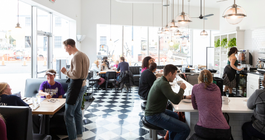
June 16, 2016
Every day on my way to work, I walk through one of the most famous and historic LGBT-friendly neighborhoods in the United States.
This past Saturday, my walk back home from the hospital was a particularly entertaining one. It was Pride weekend. People were celebrating, the sun was shining, the rainbows painted on the street seemed brighter. Even though I had worked a long day, my walk back home left me with a smile on my face. The next day, everything changed.
The following morning, I awoke to a breaking news notification that made my heart sink.
"Shooting at Popular Gay Club in Orlando."
I walked to work down the same street I always do, but the air felt different than it did the afternoon before. There was an eerie silence, the street seemed gray with trash strewn about. There were no smiles, no one was around. Of course, it was early but the tension related to the shootings was somehow palpable. Yet again, lives were ended at the hands of a murderer holding a gun.
Later in the morning as I made rounds on my own patients, I learned of the magnitude of the events from the night before. Fifty lives were lost from gun violence. Scores more were left injured. The lives of thousands of friends and families would be fundamentally changed. As I made rounds, I thought back on all of the mass shootings that occurred while I growing up. I was in sixth grade when Columbine happened. I was in medical school when Sandy Hook broke all our hearts. I was home on vacation during the Colorado theater shootings. I went to high school with one of the victims from Virginia Tech massacre.
The public has a responsibility. We need a moonshot to curb gun violence. It is obvious that we need to do more.
I remembered where I was during all those events, and I added the Orlando shootings to the list. The commonality in all those incidences is the use of guns as the massacre weapon. The oldest adage we learn in medicine is “first, do no harm.” In all of these events, man and weapons did harm. Fifty people were shot to death.
Those 50 individuals had a place on this earth; their lives were worth being born, were worth living, and now they were gone. By the time I finished seeing all my patients, it came out that the murderer who committed these crimes was of Muslim background. My heart sank again. I am a Muslim, and I know what my faith teaches me about the value of life. The Quran teaches us that when one soul kills another, "it as if he had slain mankind entirely" (5:32). I had a moment of fear of how Muslims in America would be perceived, but that moment passed quickly. I felt selfish worrying about the abstract implications of the crime instead of focusing on the value of the lives that were lost and how we could do better.
When you become a physician, you take an oath to do no harm, to value the lives of your patients, to add to the community for the better. The combination of a hateful human being with a deadly weapon leads to death, to the devaluation of life. Gun violence is a public health crisis. Eighty-eight people every day are killed by firearms. The American College of Physicians, an organization representing internists, the largest group of physicians in the United States, published a policy paper stating that gun violence is a public health issue, just as heart disease and diabetes are. On Monday, in a landmark declaration, the American Medical Association stated that gun violence is a public health issue.
It is simple. Cancer kills, obesity kills, heart disease kills, guns kill.
The public has a responsibility. We need a moonshot to curb gun violence. It is obvious that we need to do more. Access to firearms must be limited to those who have the mental capacity to use them. As President Obama mentioned in his address to the United States on Monday, individuals do not need semi-automatic weapons capable of killing multiple people at once. Access to these weapons must be restricted. We must invest in research on gun-related violence so we can evidence to curb gun related violence. The House Committee on Appropriations just voted to keep a ban on funding CDC research on gun violence. I view that as a devaluation of life. Evidence and research gives us the backbone to act on issues responsibly. In the wake of Sunday’s events, banning funding of gun violence research is a slap in the face of the families of those victims. As a public, we need to demand more.
As a physician, as a person of faith, and most importantly as a living breathing human being, it is my job to advocate for the preservation of human life. It is your job to advocate for the preservation of human life. Fifty souls left this world, and part of all our humanity left with them. No more harm.
• • •
Fatima Z. Syed, M.D., MSc works in Philadelphia.